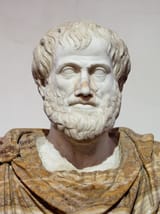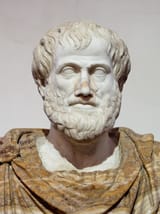4chan Search
6 results for "6e86dda1f4499a79f9b2893a95db897e"
Apologize.
Aristotle is more for political pluralism (NOT to be confused for individualism, but that the State is a plural body, shared between a partnership of clans / a friendship of hosts, think Orthodox Church hierarchy where the bishops are self-governing without a Pope or Unilateral authority -- think Holy Roman Empire or Malaysia's High King or United Arab Emirates).
By political pluralism, I mean the rule of the Estates-General as a partnership of clans (3 estates) or multi-parties as seen in multi-party democracies (multi-parties are in a way a modern variation of this partnership of clans / friendship of hosts).
Aristotle / Since the nature of a State is to be a plurality
>Further, as a means to the end which he ascribes to the State, the scheme, taken literally is impracticable, and how we are to interpret it is nowhere precisely stated. I am speaking of the premise from which the argument of Socrates proceeds, "That the greater the unity of the State the better." Is it not obvious that a state at length attain such a degree of unity as to be no longer a State? since the nature of a State is to be plurality, and in tending to greater unity, from being a State, it becomes a Family, and from being a Family, an Individual; for the Family may be said to be more than the State, and the Individual than the family. So that we ought not to attain this greatest unity even if we could, for it would be the destruction of the State. Again, a State is not made up only of so many men, but of different kinds of men.
...
Aristotle even criticizes Plato for atomization / individualism by trying to attain too much unity:
>since the nature of a State is to be plurality, and in tending to greater unity, from being a State, it becomes a Family, and from being a Family, an Individual; for the Family may be said to be more than the State, and the Individual than the family.
By political pluralism, I mean the rule of the Estates-General as a partnership of clans (3 estates) or multi-parties as seen in multi-party democracies (multi-parties are in a way a modern variation of this partnership of clans / friendship of hosts).
Aristotle / Since the nature of a State is to be a plurality
>Further, as a means to the end which he ascribes to the State, the scheme, taken literally is impracticable, and how we are to interpret it is nowhere precisely stated. I am speaking of the premise from which the argument of Socrates proceeds, "That the greater the unity of the State the better." Is it not obvious that a state at length attain such a degree of unity as to be no longer a State? since the nature of a State is to be plurality, and in tending to greater unity, from being a State, it becomes a Family, and from being a Family, an Individual; for the Family may be said to be more than the State, and the Individual than the family. So that we ought not to attain this greatest unity even if we could, for it would be the destruction of the State. Again, a State is not made up only of so many men, but of different kinds of men.
...
Aristotle even criticizes Plato for atomization / individualism by trying to attain too much unity:
>since the nature of a State is to be plurality, and in tending to greater unity, from being a State, it becomes a Family, and from being a Family, an Individual; for the Family may be said to be more than the State, and the Individual than the family.
Theory of forms: Plato
Plato's theory is often seen as the philosophical basis for the enduring power of mathematics. The idea that a perfect, unchanging circle exists independently of any physical drawing is fundamental to geometry. The pursuit of perfect, universal laws in physics, chemistry, and other sciences echoes the quest for Plato's Forms. Scientists seek to discover the universal "blueprint" or "form" that governs a phenomenon, rather than just observing its messy, imperfect manifestations.
The concept of a perfect Form or ideal is the philosophical predecessor to modern standards in manufacturing and industry. When a company designs a product, it creates a perfect "Form" or blueprint. Every physical product manufactured is an attempt to replicate that ideal. Quality control is the process of comparing the physical product to the ideal form and discarding those that fall too far short. This applies to everything from mass-produced cars to computer chips.
Plato's idea of a non-physical, perfect "Form" is an abstract concept that is central to logic and computing. In logic, we deal with perfect, formal systems that are not tied to physical reality. A computer program is a set of logical instructions—a kind of "Form"—that governs the behavior of physical hardware. The code itself exists in a logical, non-physical realm, while the computer's operations are its physical, imperfect manifestation.
The concept of a perfect Form or ideal is the philosophical predecessor to modern standards in manufacturing and industry. When a company designs a product, it creates a perfect "Form" or blueprint. Every physical product manufactured is an attempt to replicate that ideal. Quality control is the process of comparing the physical product to the ideal form and discarding those that fall too far short. This applies to everything from mass-produced cars to computer chips.
Plato's idea of a non-physical, perfect "Form" is an abstract concept that is central to logic and computing. In logic, we deal with perfect, formal systems that are not tied to physical reality. A computer program is a set of logical instructions—a kind of "Form"—that governs the behavior of physical hardware. The code itself exists in a logical, non-physical realm, while the computer's operations are its physical, imperfect manifestation.
What is even the point of studying Aristotle in this day and age? How can his metaphysics, ethics, etc. have any merit when they derive from his empirically false observation of physics?
What does Aristotle mean by "substance" (ousia)? How does he distinguish between primary and secondary substances? Why are individual, concrete things (like "Socrates" or "this tree") considered primary substances, while species and genera ("human" or "animal") are secondary?
When studying logic several materials/sources talk about a difference between arguments and explanations. However they all suck at explaining this difference. How come? Is this some modern shit perhaps?



